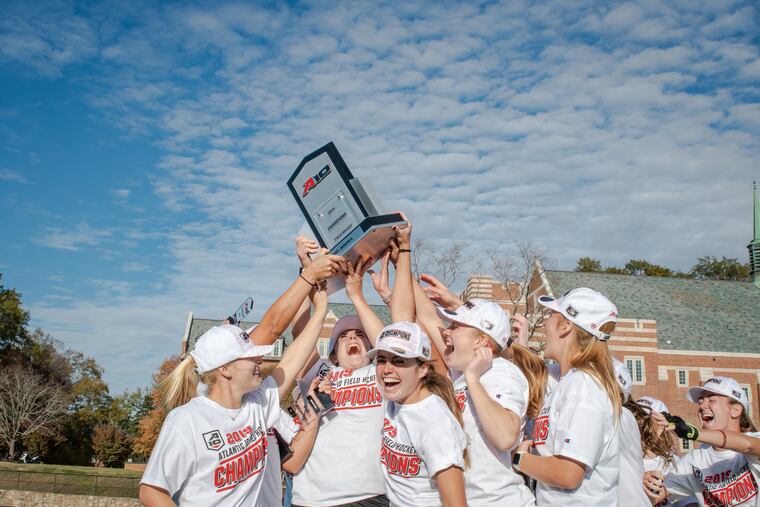The Atlantic 10 Conference has postponed the fall sports seasons to the spring of 2021
In making its announcement, the conference said it would re-evaluate the situation with the virus in mid-September to see if a reduced fall schedule could be played.

The Atlantic 10 Conference decided Friday that the health risk of conducting sports in the fall would be too great, but kept open the possibility that a seasonal schedule could be staged should the COVID-19 pandemic ease enough by mid-September.
While admitting the option is “a slim opportunity,” conference commissioner Bernadette McGlade said that it’s one “that we felt like we should keep on the table” for the A-10′s 14 member schools, including La Salle and St. Joseph’s.
“Any decisions out of that time will be decided by the status of COVID and all the national and regional bearing as it relates to the pandemic,” McGlade said in a conference call. “There would have to be a significant upward trend in all of the impacts that we’re seeing right now with regard to securing not only the health and the safety of our student-athletes but our campus community as well.”
She said if the trend is favorable, a conference schedule could begin around Oct. 4. If competition is not possible at that time, the fall sports would transition to the spring.
La Salle athletic director Brian Baptiste said that to resume competition in the fall would mean the coronavirus trend is going in the right direction, “not just for sports but in the country as a whole.”
“You get a really good snapshot,” he said. “It allows us to make decisions. It allows us once again to be nimble and flexible and it still provides some hope to our student-athletes. But at the end of the day, our intention is to fully try to have competitive sports in the spring for those fall teams that weren’t able to compete.”
The A-10 fall sports involved are men’s and women’s soccer, men’s and women’s cross country, field hockey and women’s volleyball. Nine other sports that have some degree of competition in the fall would not be able to play.
“Our student-athletes are strong, passionate, and resilient, and they deserve the opportunity to play an uninterrupted season,” St. Joseph’s athletic director Jill Bodensteiner said. “We simply did not feel that was possible in the fall semester. We will continue to support our student-athletes in all respects, including a focus on their physical and mental health.”
McGlade said the matter of testing athletes, coaches, and staff was a factor in the decision-making.
“Obviously there are so many different facets to how not only communities and now college campus communities are going to be dealing with the safety protocols that have to get put in place,” she said, “from social distancing to face masks to testing, and not only testing if you have positives or potentials on symptoms but also the surveillance testing that goes on consistently with any sizable number of individuals.”
» READ MORE: Latest NCAA coronavirus guidance hits local colleges with a thud (and a price tag) | Mike Jensen
She said no direct changes have been made with basketball, the conference’s most high-profile sport.
“I think certainly everyone is watching it closely,” she said. “We’re keeping an eye on all that and looking at the travel dynamics, etc., so I would say we are going to be in the ready positions. Basketball season looks like, if it is a truncated schedule, then we’re going to participate in every way that we can.”
McGlade admitted that concerns about the coronavirus and putting health and safety concerns over the athletes’ and coaches’ desire to compete has made this time for her “tremendously unusual.”
“You can’t make decisions by yourself,” she said. “So that’s been critically important to be able to engage the experts on campus, the leadership with presidents, the medical advisory boards, and then the practicality of what the calendar lays out before us.
“It’s a notch above a chaotic environment by adding the sobering reality of, quite frankly, individuals that you know and care about and their health and well-being. It certainly adds a different level of stress and empathy and concern to how important every decision is.”